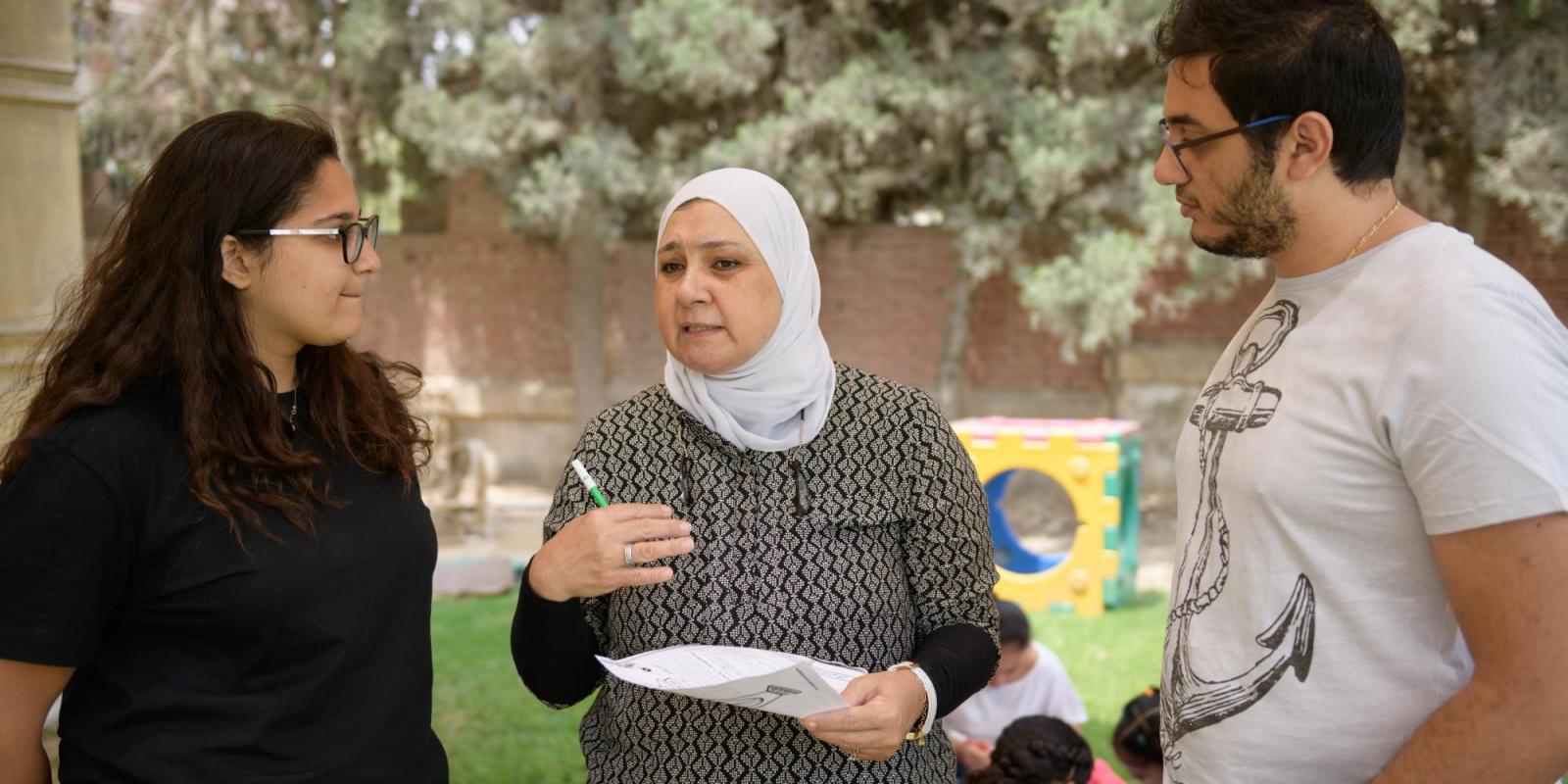
A Taste of Teaching: Educational Psychology Students Mentor Community Youth
Learning about teaching may seem simple at times. But actually applying what you learn in the classroom is another game entirely.
Likening teaching to juggling, students in Heba Kotb's Educational Psychology class had the chance to learn about the classroom experience as well as contribute to serving communities in need of educational resources and support around Egypt through activities such as learning-through-play modules, English tutoring and curriculum development.
As Kotb '84, who is an AUC alumna and an affiliate assistant professor in the Department of Psychology, explained, “A teacher handles many things at the same time – a good teacher, of course. Things may seem to be so easy, but when they see what a teacher does for real, it’s different. It gives them a real-life taste when they really go in the environment.”
This observation was one that could only be made inside the classroom itself. Years before the community-based learning (CBL) program was launched at AUC, Kotb and her colleague Hala Al Hak, adjunct faculty member, would organize trips for their psychology students to visit nurseries and schools to get a real sense of education in practice. Once her Educational Psychology class became a CBL course, Kotb was able to start organizing more trips and projects with nurseries and NGOs working in areas of need.
“This year, I tried to create more structure,” Kotb explained. “During the first week of classes, we invited three people from different NGOs to come and talk to the students about their needs.” Students then planned trips to visit the sites, work in the classroom alongside teachers, and document their reflections and observations based on both their experience with the children and their studies at AUC. Although some students received approval to visit places of their choice, most students were split among three sites: a nursery in Deweiqa run by volunteers from the area; a school in the Zabaleen district run by an AUC alumna; and Wataneya, an NGO dedicated to improving services for orphan youth in Egypt.
Kotb herself is a lead trainer at Wataneya, where she teaches the child development component of a Pearson-approved program to prepare caregivers to work with children without parental care. Additionally, she offers training for managers of institutional homes as well as social workers. Most recently, she presented research on case studies of orphaned youth at the Comparative International Education Society 2018 conference in Mexico City. AUC's Department of Psychology also has an agreement with Wataneya to have graduate and undergraduate students involved in different activities through various courses.
In parallel with their visits to these different sites throughout the semester, Kotb’s students learned about different elements of educational psychology, discussing what it means to be a good teacher, how to create effective lessons and deliver curricula as well as how to differentiate for students with varying abilities and needs. “They learn about diversity in the classroom, disability, motivation of students, learning styles and intelligence,” Kotb said, explaining some of the number of topics covered in the course. “Then they observe for themselves what we see in the classroom.”
The students engaged with these organizations in different ways, playing with children in learning-through-play modules, helping students prepare for exams, monitoring group work, teaching English lessons and even offering support for curriculum development.
“I think what I personally got from it was seeing how play actually affects the children and how they learn from it, how they get better over time,” said Joseph Ghobrial, psychology major who visited a nursery in Al Sonbola Al Khadraa with a group of peers.
Another psychology student, Amina El Kerdani, had the chance to step into the shoes of her previous teachers, choosing to visit her old elementary school. During her four visits, El Kerdani worked on English with a first-grade class.
During her sessions with the children, El Kerdani noticed that there were significant improvements that could be made in teaching style to motivate students in the classroom and enhance their development. The students discussed similar observations, both positive and negative, citing the teaching methods and developmental topics brought up during the course of the semester. Kotb encourages her students to reflect on how their observations and connections to subjects in psychology can impact the communities around them, also always ensuring that students aim to present feedback in a constructive manner.
“It was very interesting looking at them from a different perspective,” said El Kerdani. “A lot of the theories we talked about in class really did apply – some of them more than others. It was interesting to understand some of the dynamics happening in class.”
